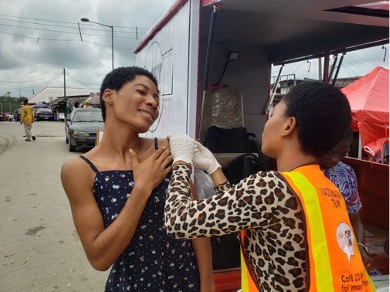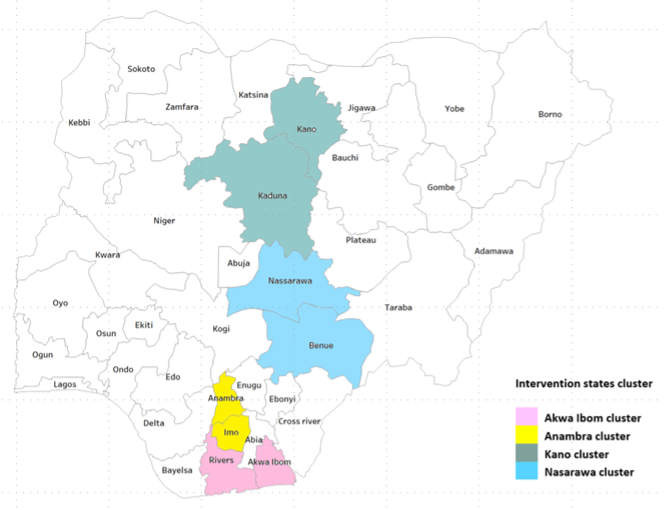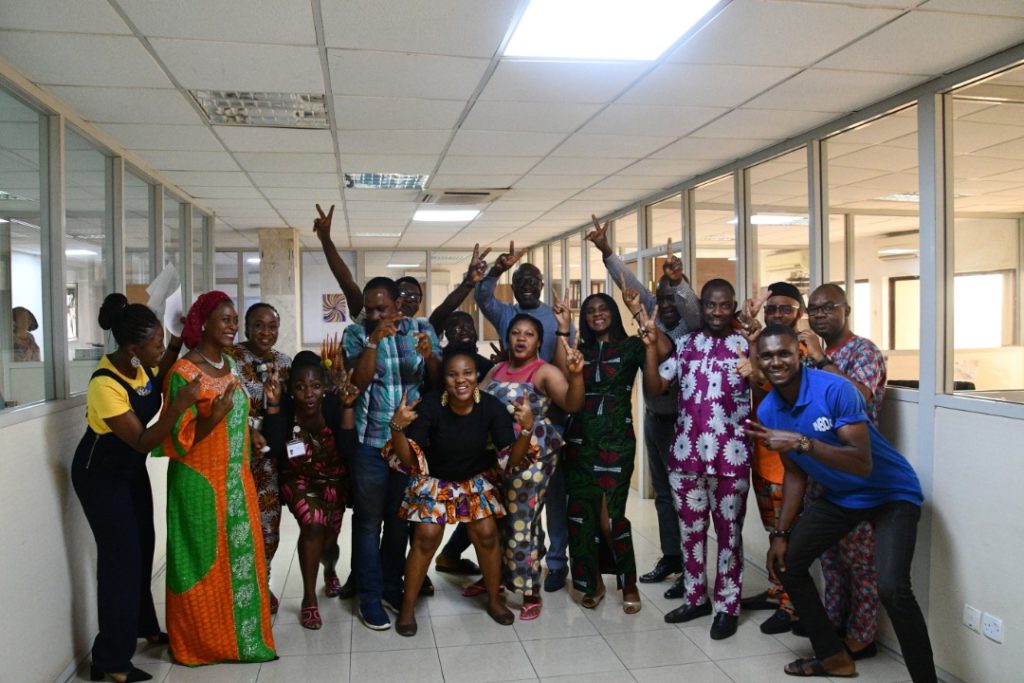JENSEN PAEDIATRIC TB SURGE PROJECT

The Pediatrics TB Surge is a five-month project funded by Jensen Pharmaceuticals through USAID to rapidly increase childhood TB diagnosis in states within the most need. It leverages on the USAID Funded TB LON project and complements the active TB case finding in a manner that address existing gaps in childhood TB case finding including under diagnosis.
The project is being implemented in three Northern states on the USAID funded KNCV Nigeria TB LON 1 & 2 project namely Kano, Katsina, Bauchi and one Southern State Akwa Ibom. These are high TB burden states with a combination of three or more of the following: large population density, high incidence of under nutrition, high number of nutrition clinics availability of diagnostic facilities, high number of Children on the streets, high TB yield but less than 7% childhood TB, Large number of slums, high number of public schools.
Paediatric TB Surge activities include Expansion of Childhood TB Active Case Finding (ACF) to schools, expanding coverage of ACF in Nutrition, immunization and child health clinics; support of childhood TB targeted community TB case finding and improving access to diagnostic using based Xpert test and Chest Xray.
It is expected that these activities will close the gap between estimated and notified childhood TB cases in implementing states.
TB DIAGNOSTIC CONNECTIVITY PROJECT

This one year project is funded by Stop TB Partnership with the aim to introduce and strengthen the use of the Aspect connectivity solution for TB diagnostic instrument networks in Nigeria.
The project will be implemented by KNCV Nigeria. The WHO Global TB Programme has strongly advocated for countries to adopt diagnostics connectivity solutions to make optimal use of the data produced by newer diagnostic instruments that produce digital data.
The 2016 WHO framework of indicators and targets for laboratory strengthening under the End TB strategy includes as a cored indicator the establishment of diagnosis connectivity solutions to concert all TB diagnostic testing sites that have instruments producing digital data. Under this project KNCV Nigeria will work with the National Tuberculosis Leprosy and Buruli Ulcer Control Programme (NTBLCP) and system one to establish connectivity for 38 Truenat instruments provided under the Stop TB/USAID introducing New Tools Project using the Aspect platform.
TB IMPLEMENTATION FRAMEWORK AGREEMENT (TIFA)

- TB Contact investigation using Spot-to-tent onion Model (TBCI-STOM)
- Social franchising as a sustainable tool for TB contact investigation in the private sector (SOFT_CIP)
These are two TIFA Tuberculosis Implementation Framework Agreement projects being implemented by KNCV Nigeria. TIFA is part of USAID’s Global Accelerator to End TB. It is a five year initiative (2019-2024) that supports USAID Mission efforts to strengthen host government commitment in the fight against TB by increasing country ownership and accountability to accelerate progress toward TB eradication. TIFA issues TB Commitment grants (TCG) as its funding mechanism.
- TB Contact investigation using Spot-to-tent Onion Model (TBCI-STOM) The KNCV TBCI STOM is a 1-year TIFA TCG for contact investigation. The overall purpose of TBCI STOM is to improve systematic contact investigation of bacteriologically diagnosed index TB Patients using technology, via Competency Based Training of Community Health Workers (CHWs) who implement a novel spot-to-tent onion model as an effective method for the timely diagnosis of TB patients and provision of TB preventive treatment (TPT) to eligible contacts, Collaborating with NTP the grants is implemented in Akwa-Ibom state which is one of the USAID-funded TB LON project states with supported activities on the project including development of policy documents and tools for contact tracing: capacity building of Community Health care workers (CHWs) on contact investigation through Competency Based Training approach, Contact investigation of bacteriologically positive index TB cases; community case finding within 2km radius of index patient location through the spot to tent onion model and scale up of preventive Treatment (TPT).
- Social franchising as a sustainable Tool for TB contact investigation in the private sector (SOFT_CIP) The SOFT-CIP is a 1-year TIFA grant which leverages on the structures set up by the TB LON project In Kano state to improve contact investigation and TPT uptake in private health establishments utilizing social franchising. The objectives of the project are:
- To increase the coverage of contact investigation among targeted private healthcare facilities in Kano State from 25% to 95%.
- To identify all eligible contacts for TPT among the contacts of the index TB Patients who were investigated.
- To increase the uptake of TPT among eligible contacts of infections TB cases notified from private health facilities in Kano state from 4% to 25% within a year it is hoped that with the implementation of this grant the health system would be strengthened, while ensuring that underserved populations have access to high quality TB services in cost effective and timely manner.
GLOBAL FUND PROJECT

The new funding model (NFM) 3 Global Fund, Public Private Mix (PPM) Grant was awarded to institute of Human Virology Nigeria (IHVN) as the principle recipient (PR) KNCV Nigeria as the sub recipient (SR) for the grant.
The KNCV ATM grant is for 3years and implemented in 5 states. (Akwa Ibom, Benue, Cross river, Plateau, and Rivers state ), aimed at increasing private sector participation inTB control activites. Cumulatively the grant aims to support private health establishment in these 5 states to identify, treat and notify 31,100 TB patients over the 3 years lifespan of the project, as well as maintain a treatment success rate (TSR) of at least 90% of all TB Cases notified.
Activity implementation in all 5 states commenced in 2021, And KNCV works with the following provider types tio actively screen, diagnose and manage TB cases:
- Faith based Hospital and clinics (FBO)
- Private for Profit hospitals and clinics (PFP)
- Private stand alone laboratories
- Patient medicine vendors (PMV)
- Community pharmacies (CP)
The COVID Vaccination Acceleration Project


The COVID -19 Vaccination Acceleration project being implemented in eleven states. 1. Anambra 2. Imo 3. Taraba 4. Kano 5.Kaduna 6. Cross River 7. Bauchi 8. Plateau 9. Benue 10. Katsina 11. Nasarawa, has an overall goal of promoting COVID-19 vaccine access, acceptability, and uptake, while strengthening adverse drug reaction feedback and timely response, by leveraging on the ongoing USAID supported Tuberculosis Local Organization Network (TB LON) 1 & 2 project structures. To ensure acceptance and address the challenges posed by vaccine hesitancy, the project strategically integrates the vaccination program within the KNCV Nigeria TB LON community outreach TB active Cases Finding (ACF) intervention while also leveraging on our structure in the supported public and private health facilities. The project has an overall target of reaching 1,454,479 people with full COVID-19 vaccination.
Vaccination across the seven states began in July 2022 and the project has deployed innovative strategies such as mobile vaccinations in institutions such as military and paramilitary barracks, motor parks, churches, mosques, schools to improve access to vaccinations. Another innovative strategy aimed at reaching people in extremely difficult terrain is the deployment of reconfigured tricycles “WOW Keke”. These are to be equipped with portable digital X-ray machine (DLB) and Truenat or TB LAMP devices and to be deployed to distant and hard-to-reach communities to provide integrated health services with COVID-19 vaccination and other reasonable medical concerns as well as provide Routine drugs and screening for chronic illness (Hypertension and Diabetes). Strategies such as reminder call to clients to ensure full vaccination have also been deployed.
The ACE Project

The ACE 6 (Accelerating Control of the HIV Epidemic Cluster 6) Project is being implemented in three states namely Bayelsa, Edo and Lagos states with a consortium of partners led by the Heartland Alliance as the principal recipient and KNCV Nigeria as one of the sub grantees. The project employs a rights-based approach that integrates contextual health systems
strengthening with comprehensive HIV care, including critical services like access to justice and gender mainstreaming.
KNCV Nigeria is a consortium partner in providing technical assistance towards community and facility TB case finding, linkage, and treatment across the three project states.
The Nigeria DATs Project
The Digital Adherence Technologies (DATs) Project is funded by Stop TB Partnership/UNOPS (United Nations Office for Project Services) and implemented by KNCV TB Foundation Nigeria with a consortium of partners – KNCV Tuberculosis Foundation Netherlands and Interra Networks. The DATs project is aimed at comprehensive introduction of digital adherence technologies to support tuberculosis treatment across eight states in Nigeria: Akwa Ibom, Anambra, Benue, Imo, Kaduna, Kano, Nasarawa, and Rivers through two intervention models:
- 99DOTS medication labels – Use medication labels that contain a unique single 3-digit code and the country SMS short code number to track records of daily drug intake by TB patients.
- VOT (Video-observed Therapy) – Use SureAdhere mobile app to record videos of drug intake by TB patients, enabling remote adherence monitoring through video technology by the Healthcare workers.
The project is the first TB treatment adherence technology to be implemented within the National TB program in Nigeria. It is focused on an integrated deployment approach, with different DAT options for patients and one unified application for the healthcare worker. The different DAT model helps to remind patients to take their medications, facilitate digital observation of pill-taking, compile dosing histories, triage patients based on their level of adherence, thereby facilitating the provision of individualized care by the TB program based on patients risks. The duration of the project is one year.



Celebration
time🍾
🎉.
We made it. USAID TB LON Project Region 1 and 2. Congrats to the KNCV Family
and we are grateful to the American People. With the funding from USAID, KNCV
TB Foundation Nigeria will be supporting comprehensive TB treatment and care
across 14 states in Nigeria for a 5 year period 2020 to 2025.

USAID Nigeria TB LON Region 1 and 2 Project
The TB LON Project is funded by USAID Nigeria and focuses on locally generated solutions to provide TB prevention, screening, diagnosis, treatment and notification, while addressing stigma and discrimination. The TB LON region 1 and 2 project is to be implemented by KNCV TB foundation Nigeria to expand the provision of and increase access to TB services among formal and informal health providers through the engagement of the private sector, umbrella and local chapters of health and allied professional organizations, faith-based institutions, communities and civil society.The project is targeted at increasing the number of tuberculosis (TB) cases that are detected, treated and notified to 437,895 within the five year grant implementation period 2020 to 2025 and implemented across 14 states in Nigeria; Bauchi, Kaduna, Katsina, Kano, Nasarawa, Plateau, Taraba, Anambra, Akwa Ibom, Benue, Cross River, Delta, Imo and Rivers State. The project’s four intermediate results are as follows;
- Improved access to high-quality, person-centered TB, DR-TB, and TB/Human Immunodeficiency Virus (TB/HIV) services;
- Strengthened TB service delivery platforms;
- ReducedTB disease transmission and progression and
- Accelerated TB innovations with improved impact on program implementation
KNCV Nigeria is working with a consortium of partners- two sub recipients- CCCRN and KNCV International and six strategic service package providers- Intrasat Global, IPCD, Jana Health Foundation, Diadem Consult, Public Health Concerns Ltd and TB Network. Towards meeting the project set targets, KNCV Nigeria and partners adopted a mixed model of community and facility based, health systems strengthening strategies and digital solutions to find TB cases in a Roll in, Roll on and Roll out staged approach. Roll in is in year 1 which is the planning stage, collaborations and capacity building, Roll on is the saturation stage in Year 2,3 and 4 while Roll out in year 5 is the transitioning Stage.
The WASP Project
The WASP project is a USAID funded project through a cooperative agreement with Abt Associates/SHOPS Plus and implemented by KNCV Nigeria. In line with the National Strategic Plan for TB Control 2015-2020 the WASP project targets to increase Drug Susceptible and Drug Resistant Tuberculosis case detection in 14 high TB burden states by improving universal access to TB diagnosis and treatment through 4 strategic intervention areas
• Wellness on Wheels – Mobile Diagnostic Units/trucks in Kano state
• Ad-hoc staff for high-burden GeneXpert sites in 13 states
• Surge Initiative in 9 states
• Programmatic Management of Drug-resistant TB (PMDT) in 12 states
The WASP project represents a significant blend of proven high yielding interventions for TB case finding deploying a right mix of facility, community and health systems strategies implemented by a select team of highly skilled and motivated professionals. The duration of the project is one year.
